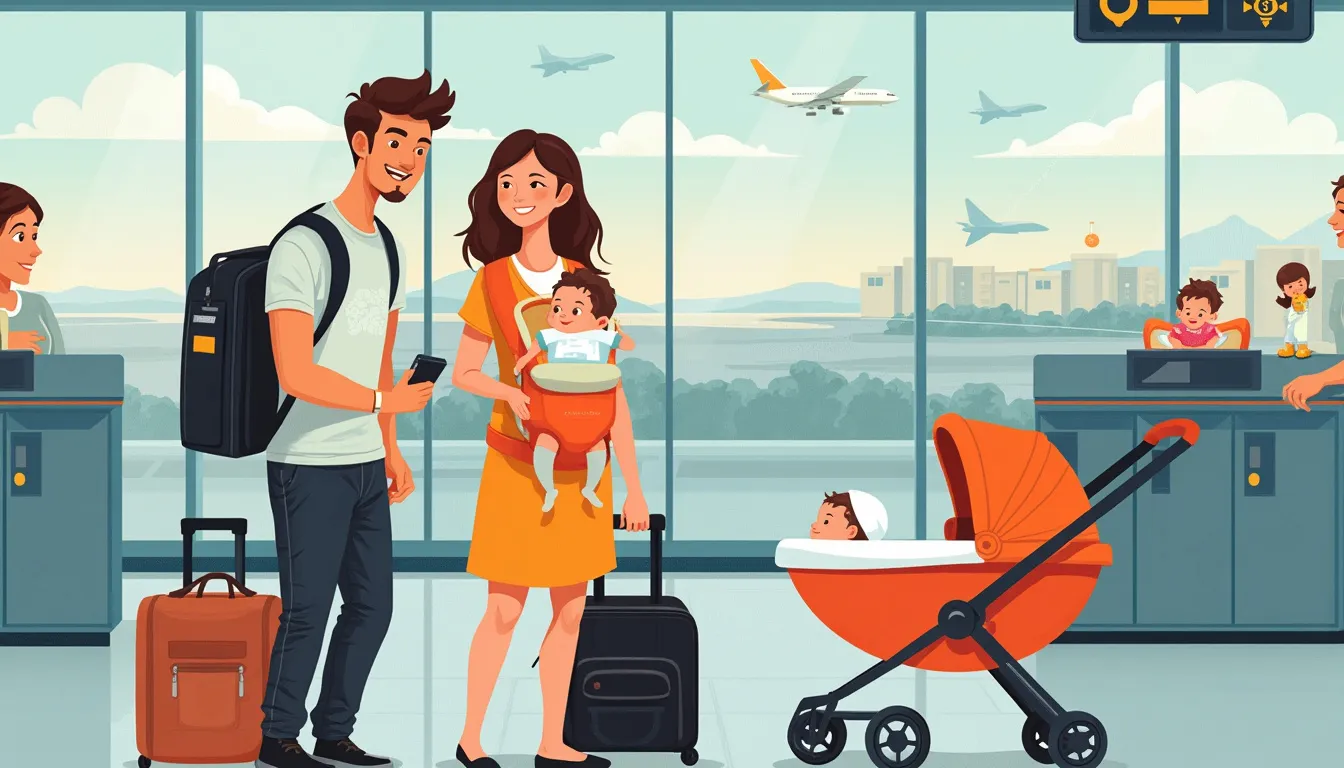Traveling with a newborn can be an exhilarating yet challenging experience for new parents. As daunting as it might seem, careful planning and the right strategies can make flying with a newborn a smooth and enjoyable journey. Whether you’re venturing out to visit family or embarking on your first holiday together, understanding key aspects of pre-flight preparations and in-flight tips is crucial. From booking the ideal flight and ensuring all necessary documentation to packing the essentials and employing effective soothing techniques during the flight, each step plays a vital role in ensuring comfort for both you and your little one. By mastering these top tips for flying with a newborn, you can transform what might seem like a daunting task into a memorable and stress-free adventure.
Pre-Flight Preparations for Flying with a Newborn
Booking the Right Flight: Choosing the Best Time of Day and Seats for Comfort
When flying with a newborn, booking the right flight can make a significant difference in ensuring a smoother journey for you and your baby. The time of day you choose can greatly impact your newborn’s comfort and mood. Many parents find that booking flights during their baby’s regular sleep times, such as early morning or late evening, can help their infant sleep more easily through the journey. Additionally, flights that are less crowded, often midday or midweek, can offer a more relaxed environment for both you and your newborn.
Seating arrangements are equally crucial. When booking your seats, try to select a bulkhead seat if possible. These seats usually offer more legroom and space, providing you with more room to maneuver and care for your newborn. If you are flying long-haul, some airlines provide bassinet seats, which can be a lifesaver, allowing your baby to rest more comfortably and freeing up your arms for relaxation.
You might also consider booking an aisle seat, which provides easy access to the restroom for diaper changes and allows for more freedom to walk around and soothe your baby. If traveling with a partner, you might book an aisle and window seat, leaving the middle one free in hopes that it remains unoccupied. This will give you extra space and flexibility during the flight.
Essential Documentation: Ensuring You Have the Necessary Paperwork for Your Newborn
Preparation is key when it comes to documentation, as flying with a newborn involves more paperwork than solo travel. Ensuring you have all the necessary documents can prevent unnecessary stress at the airport and streamline the check-in process.
First and foremost, check with your airline regarding their specific policies for traveling with an infant. Most airlines require proof of age for newborns, typically in the form of a birth certificate or a passport for international flights. Some countries also require additional documents such as a visa or a letter of consent if one parent is traveling solo.
If your newborn does not yet have a passport, apply well in advance of your travel dates. Passport processing times can vary, so it’s best to start this process early. Don’t forget to carry a few extra passport-sized photos of your baby, as these can sometimes be required for various travel forms and emergency situations.
Additionally, if you’ll be using formula, breast milk, or medication during the flight, it’s prudent to check security checkpoint requirements. Some airports require documentation or doctor’s notes for carrying baby food and medications in your carry-on. Make copies of all important documents and store them separately from the originals for added security.
Packing Essentials: What to Pack in Your Carry-On to Keep Your Newborn Comfortable and Entertained
Packing for a flight with a newborn involves a good balance between having everything you might need and not overloading yourself with too many items. Here’s a list of essential items to pack in your carry-on to keep your newborn comfortable and entertained throughout the flight:
1. **Diapers and Changing Supplies**: Pack enough diapers to last the duration of the flight, plus a few extras in case of delays. Don’t forget wipes, a changing pad, and diaper rash cream.
2. **Formula/Breast Milk**: If your baby is formula-fed, bring pre-measured formula and bottles filled with water, or ready-to-feed formula bottles. For breastfeeding mothers, a lightweight nursing cover can provide some privacy. Remember that breast milk and formula are exempt from the usual liquid restrictions, but you will need to declare them at security.
3. **Extra Clothes**: Bring at least two changes of clothes for your newborn and an extra shirt for yourself – in case of spills or accidents. Opt for comfortable, soft fabrics to keep your baby cozy.
4. **Blankets and Layered Clothing**: Airplane cabins can range in temperature, so it’s wise to dress your baby in layers. A favorite blanket can also serve as a comfort item and a makeshift changing pad.
5. **Pacifiers and Toys**: Pacifiers can help with ear pressure during takeoff and landing by encouraging your baby to suck and swallow. Small, quiet toys can keep your baby entertained, but avoid bringing noisy or overly stimulating toys that might disturb other passengers.
6. **Baby-Friendly Snacks**: If your baby has started eating solid foods, bring easy-to-pack snacks like puffs, teething biscuits, or fruit puree pouches. These can also help with ear pressure and keep your baby occupied.
7. **First-Aid Kit**: Include any prescription medications, infant pain relievers, a digital thermometer, and basic first-aid supplies in a small kit. Knowing you have these items on hand can offer peace of mind.
8. **Sanitizing Supplies**: Airplane trays and seats can be germ hotspots. Pack hand sanitizer, antibacterial wipes, and a bag for storing soiled items or trash.
Packing thoughtfully and proactively can ensure that you have everything you need to keep your newborn content and comfortable during the flight, allowing you to focus on making the journey as stress-free as possible.
Discover more travel tips and insights on our blog.

In-Flight Tips for a Smooth Experience Flying with a Newborn
Managing Cabin Pressure
One of the primary concerns while flying with a newborn is the change in cabin pressure during takeoff and landing. Newborns are particularly sensitive to these changes, which can cause discomfort in their ears. To help your baby manage ear pressure, consider giving them a bottle, breastfeeding, or using a pacifier during takeoff and landing. The sucking motion will help equalize the pressure in their ears, reducing discomfort.
Another method to manage cabin pressure is to consider using ear plugs designed for infants. These specially designed plugs can help in alleviating ear pain caused by pressure changes. Additionally, if you notice your baby is showing signs of discomfort or unexplained crying, gently massaging their ears and having them swallow or yawn can offer relief.
Feeding and Sleeping Strategies
Feeding and sleeping are crucial aspects to address when flying with a newborn. An important tip is to try and keep your baby’s feeding schedule as close to their regular routine as possible. If you’re breastfeeding, it’s convenient, but if you’re bottle-feeding, make sure to pack enough formula and clean bottles, along with some extra in case of flight delays.
When it comes to sleeping, the hum and motion of the airplane can actually be soothing for many newborns. To help maximize their sleep, bring along their favorite blanket or sleep sack. It’s essential to try and create a familiar sleeping environment, so having a small, soft toy or a piece of clothing that smells like home can be comforting.
Consider booking a bassinet seat if available on your flight. These seats are generally at the front of the cabin and provide a crib-like attachment where your newborn can sleep safely. Remember to check with your airline in advance as bassinets are available on a first-come, first-served basis and may come with specific guidelines and weight limits.
Keeping Your Newborn Calm
Keeping a newborn calm during a flight can be one of the most challenging aspects of traveling. Being proactive in attending to their needs can help prevent unnecessary stress for both you and your baby. Frequent nursing, bottle-feeding, or pacifiers help in soothing them, as the sucking instinct is inherently calming for infants.
Before your flight, get acquainted with different soothing techniques such as rocking, gentle back rubbing, or singing lullabies. Having a variety of tools at your disposal can be pivotal. Some parents find that wearing their baby in a sling or soft carrier can help keep them close and calm. This not only provides comfort to the baby but also keeps your hands free for any other tasks.
Another useful tip is to consider the impact of your own stress on your newborn. Babies are highly perceptive and can pick up on parental anxiety. Try to stay as calm and relaxed as you can, which will, in turn, help soothe your baby. Bringing noise-canceling headphones or playing white noise on your phone can also create a more serene environment for your newborn.
To add an extra layer of preparation, consider downloading a few baby-friendly music playlists or white noise tracks on your phone or tablet. These sounds can act as a comforting and familiar backdrop to the unfamiliar noises of an airplane, helping to keep your newborn calm throughout the journey.
By employing these in-flight tips, managing cabin pressure sensitively, maintaining a consistent feeding and sleeping routine, and keeping your baby calm through proactive soothing methods, you can significantly enhance your experience flying with a newborn.
Embarking on a journey with a newborn can be a daunting task, but with careful planning and a few strategic approaches, it is entirely manageable. By booking the right flight, you can optimize comfort for both you and your baby. Selecting flights that coincide with your newborn’s sleep schedule and choosing seats that offer the most convenience, such as aisle or bulkhead seats, can significantly enhance your travel experience. Ensuring you have all necessary documentation well in advance will help avoid last-minute stress and keeping a well-stocked carry-on bag with all the essentials, from diapers to favorite toys, is key for a smoother journey.
Once on board, being prepared for potential cabin pressure changes is crucial. Techniques like feeding or using a pacifier during takeoff and landing can mitigate discomfort for your newborn. Additionally, keeping your baby well-fed and rested is essential; planning feeding times around the flight schedule and using familiar sleep aids can promote restfulness. Cultivating a calming environment by bringing along a favorite blanket or engaging in soothing activities will help maintain your newborn’s calm demeanor.
Incorporating these practical tips into your travel plans can transform flying with a newborn from an overwhelming challenge into a more enjoyable and stress-free experience. By anticipating needs and adopting a proactive approach, you set the stage for more relaxed and memorable journeys, allowing you to focus on the joy of traveling with your newest family member.







